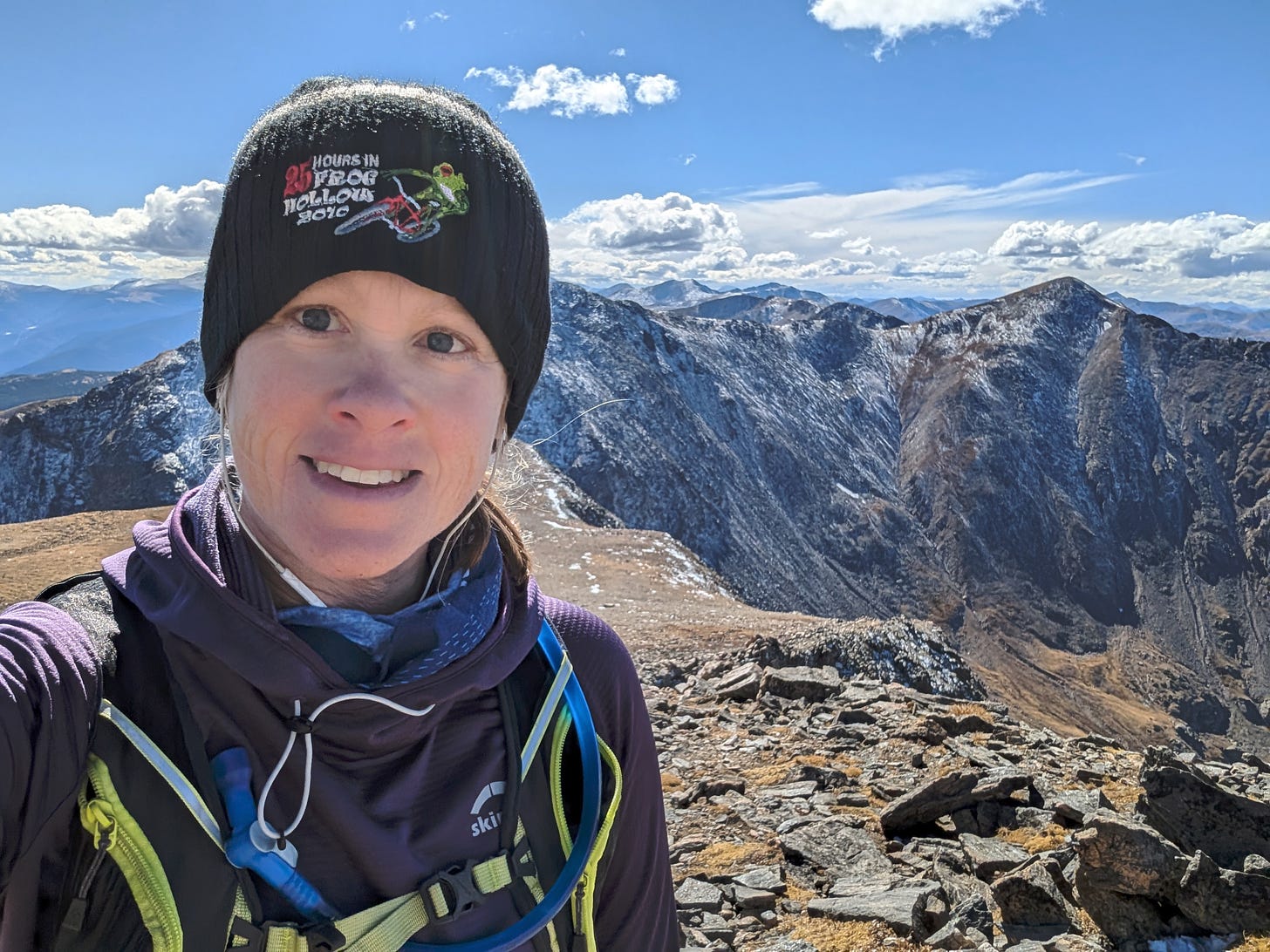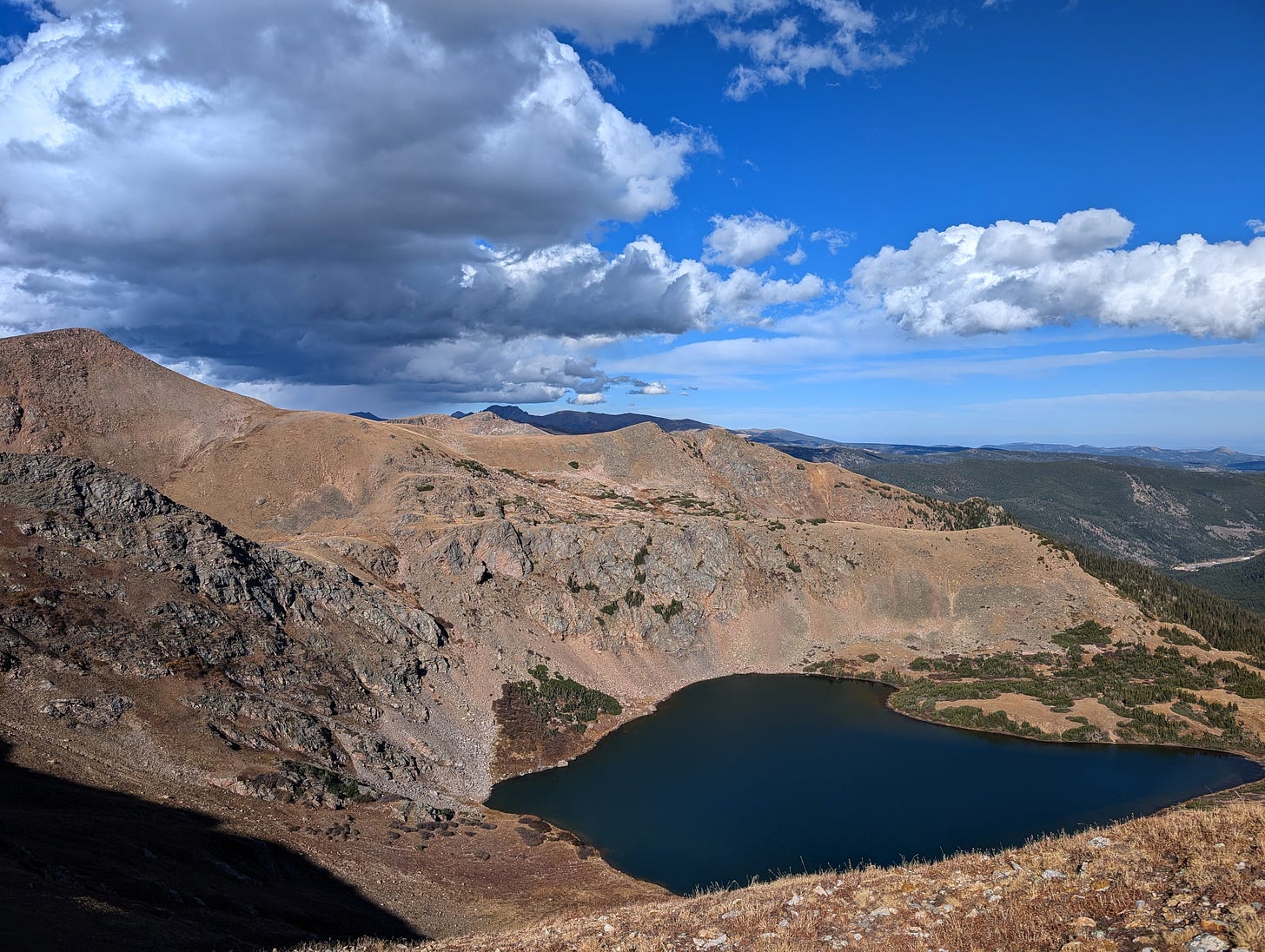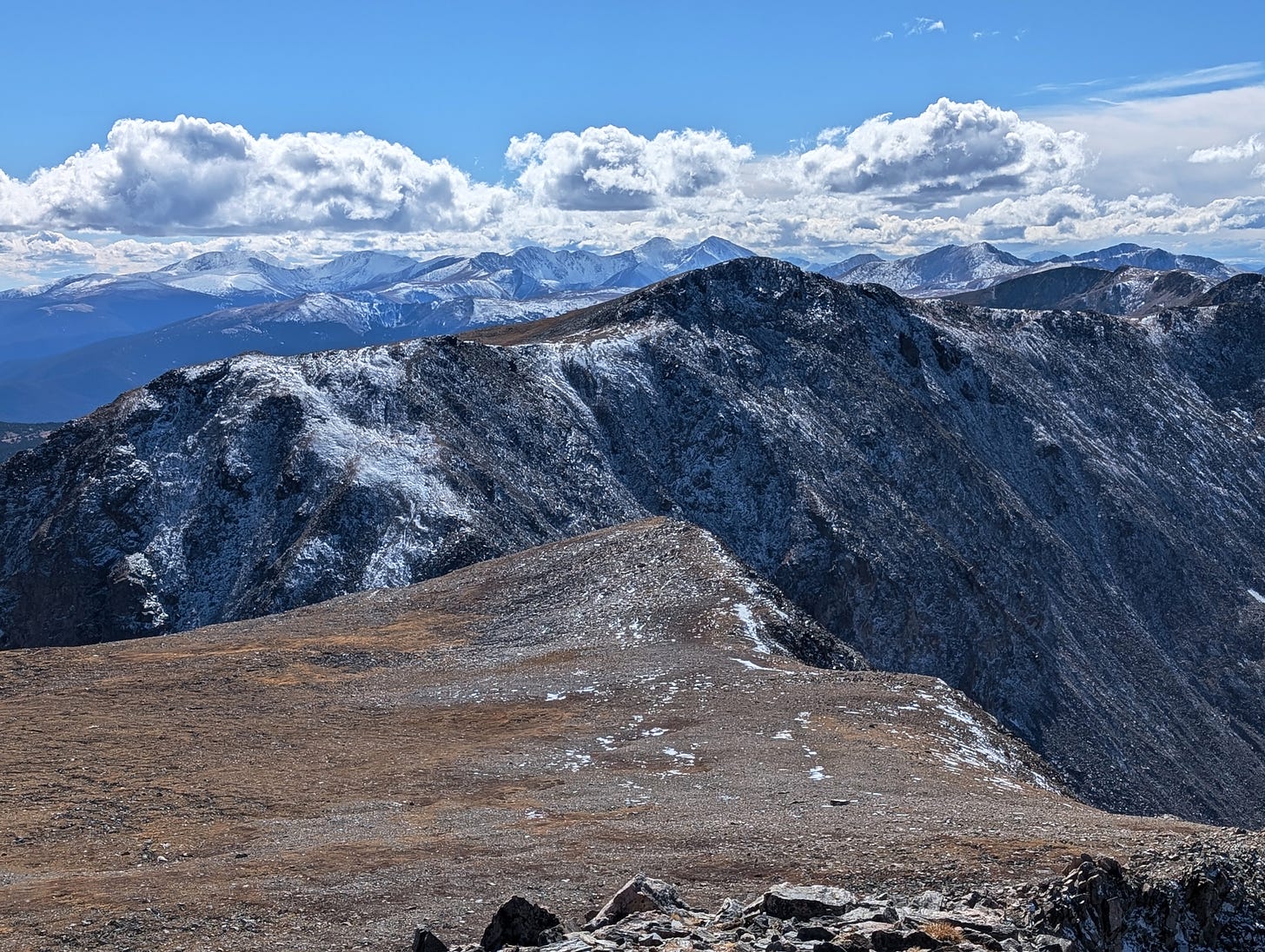This autumn has taken my breath away, in a literal sense. I’ve dealt with fall allergies for years, but this season has been particularly aggravating. Warm temperatures, bursts of pollen, strong winds, swirling dust, 25 days without a drop of rain, desiccated air, and particles of dried-up vegetation are filling my airways with enough inflammation to prompt frequent pushes of the panic button (my emergency inhaler.) Through this I have lost hope for maintaining a semblance of cardiovascular fitness. It doesn’t help my outlook to remind myself this asthma flare is temporary (is it?) No, it’s more effective to respond to the discouragement with gratitude. Any activity I can get through without wheezing or stumbling in hypoxic disorientation is “a good run.”
This resolve to be content rather than combative feels healthy. I will admit that the self-flagellation persists. Earlier this week, I returned from a run that I started with optimism after a short burst of rain left about 0.13 inches of moisture on the dusty trails. It was my best run in weeks but was still significantly slower than my time on the same route in October 2023, when I was training for a 50-mile trail race in the desert. This realization brought a flash of discouragement: “This time last year, I was fit enough to run a 50-miler in the desert in 12 hours. There’s no way I could aspire to such a feat this year. And it’s not that I’ve done anything significantly different with my time. It’s just punishment for being my perimenopausal self who for some reason can’t $#% breathe.”
But the grumbling quickly loses steam. I recognize combativeness doesn’t help anything, and instead remind myself to “Breathe. Just breathe.” It’s October 2024 and I’m grateful I have the freedom to move through the outdoors as I please and the health to still go as far as I want, if not with the ease or grace I’d prefer. It’s October 2024 and my 46-year-old college friend is still in critical condition after suffering a stroke two weeks ago. It’s October 2024 and my friends in Juneau are currently dealing with the imminent threat of glacial flooding and landslides. Like so many others living in areas that were supposed to be protected from the worst effects of climate change, they write about how “living through a continuous natural disaster with no end in sight can create an overwhelming sense of hopelessness, making even the simplest aspects of daily life unattainable.” Any of us could have our lives upended tomorrow. So I cling to my mantra — “Every day is a gift.” These simple words — along with “breathe, just breathe” — have been surprisingly effective in halting the doom spiral.
For reasons I can’t explain, I have been feeling strangely hopeful. Perhaps I’ve been too oxygen-deprived for too long. Believe me, I know November 5 is just two short weeks away and it will be a calamity no matter what. I still work for a newspaper and read journalism in my free time and can’t resist learning all I can about the relentless wars and disasters of our times. I’ve discovered Substack Notes as a replacement for Twitter doomscrolling, and it’s not better. Whenever the wind is gusting, I gaze out the window and wonder if today is the day the fire will come.
Yet there’s freedom in relinquishing control, and I believe I’m nearing that point. “Whatever happens, I’m going to be here, I’m going to live this story, I’m going to witness the beauty and terror, I’m going to be astonished, and I’m going to tell about it. So you know what? It doesn’t matter one bit that I’m too wheezy to run today.”
There’s freedom in giving up on self-centered ambitions, even while I tell myself this waywardness is temporary while I try to catch my breath.
So I’m back on the wagon of trying “all of the things” to improve my health — including not forcing hard exercise when my body is fatigued and reducing time outdoors when my lungs feel constricted. But one simple pleasure I’ve allowed myself is Sundays in “The Church of the Blue Dome.” I thought typical fall weather would force these outings into a simpler rhythm. But fall hasn’t come yet, so I find myself without excuses to stay away from the mountains.
This past Sunday, my mountain was James Peak — a familiar, comfortable temple, but still one that soars 13,300 feet into the thin atmosphere. The mountain forecast called for a high of 42 degrees on the summit, and with minimal wind, it was likely to feel warmer than summer. Still, there were only about 15 vehicles at a trailhead that is normally overflowing with many dozens of cars on weekends. After two miles, I didn’t see a soul besides the chickadees and pikas.
I settled into a comfortable pace, striving to focus on present things and keep my head away from the doom spirals that it likes to find. Spruce branches, trickling streams, flickers of sunlight, rotting tree trunks, the macabre artwork of the mountain pine beetle, the boulders strewn across the trail, the hopscotch-like motion of my feet through the rocks.
I marched toward the Continental Divide, feeling better than I expected to feel. The ridge was bathed in its sad October beige, the color of everything that has long died but hasn’t yet been buried beneath winter snow. Tufts of grass collapsed into dust as I crossed the tundra. The dried remnants of Rocky Mountain thistles curled into themselves. There wasn’t a whisper of wind and the high-altitude sunlight warmed my face until sweat trickled through my hair. I thought about the eerie quiet and loneliness of this place, stuck in limbo between summer and whatever comes after.
I heard a loud chirp and looked toward the boulder field beneath the ridge. A pika stood upright on a rock, chirping another warning at me.
“What are you doing out today little pika?” I asked. “There are no flowers left to gather.”
The pika continued to stand in place, proud and unafraid. I thought this little pika might just be my favorite animal — adorable balls of fluff who thrive in the most fearsome mountain terrain, scurrying effortlessly over rocks as they work hard to gather wildflowers and sedges for the brutally long winters. They don’t hibernate but instead tunnel through the snow, searching for lichens and moss, and fortifying their borrows. They’re impressively hardy creatures, except for their struggle to survive when temperatures spike over 77 degrees. Every summer, as the ambient temperatures increase for longer periods, the pikas lose habitat and foraging time. I think I don’t want to live in a world that can’t support pikas. I fear one day, much sooner than anyone expects, we may live in this world.
As I traced the spine of the Divide, I glanced to the west toward the Jim Creek Valley. This view of a scar from the derecho of September 2020 was jarring. As the last live branches of that astonishingly destructive wind event rot and fall away, what’s left is a matted tangle of tree skeletons. The deadfall is so thick that no new growth has sprung up in its place, so it looks like the mountainside has mange. My thoughts drifted through 2020, where on this day in October, all of the fires were burning — hundreds of thousands of acres of blackened forest whose scars also remain fresh four years later. I thought, damn, 2020 was a rough year. A pandemic, isolation, riots, violence, storms, fires, floods, and a severe cultural fracturing from which we have not begun to recover, but instead have only deepened our entrenchments. Sometimes I wonder if 2020 was a practice run for hardships in the years to come, and we failed miserably. We put out the fires, but we didn’t plant new seeds.
Still — almost unfathomably — these troubling thoughts didn’t dampen my spirit. I meandered up the rocky north face of James to its broad summit, which held a delicate dusting of snow. The air was still eerily warm and calm. I didn’t even need a jacket or protection from the wind shelter as I sat on a boulder, admiring the snow-capped skyline of Mount Blue Sky, Bierstadt, Grays, and Torreys in the distance, and nearest to me, Mount Bancroft, where Beat and I got engaged in 2020 — a good thing that happened that year. Sometimes I almost forget. I took my time to sit in wonder and savor a pocket-warmed protein bar, which I brought for its nutritious content of protein, vitamins and fiber, and was now all I had left because I polished off my “reward” packet of Oreo cookies while battling my way toward the Divide. Still, I was hungry, and even this chalky protein bar tasted sinfully delicious.
I felt content. I wished I could just stay here, sitting on this peaceful mountain, until sometime well after November 5 — knowing full well that a winter storm was on the way and within a day this place would be engulfed in a whiteout blizzard, exposed to the kind of cold that can be astonishingly violent and unforgiving.
Summer is not endless, and things will change. This brings me hope because I’ve convinced myself that my breathing will improve as soon as the dust and pollen finally settle beneath the winter snow. But also, there’s freedom in accepting impermanence. If nothing is certain, then anything is possible.








Love this post. Your “Every day is a gift” mantra is a good one to have, especially in these fraught times. Your writing is so eloquent.
Pikas! I identify with pikas. A very narrow range of environments where they can live. I used to see them when I was hiking up in the Wallowas in NE Oregon. I don't live there now, and I miss it, but your hike reminds me of places there, and in Boulder where I grew up.
Gratitude...one day at a time.